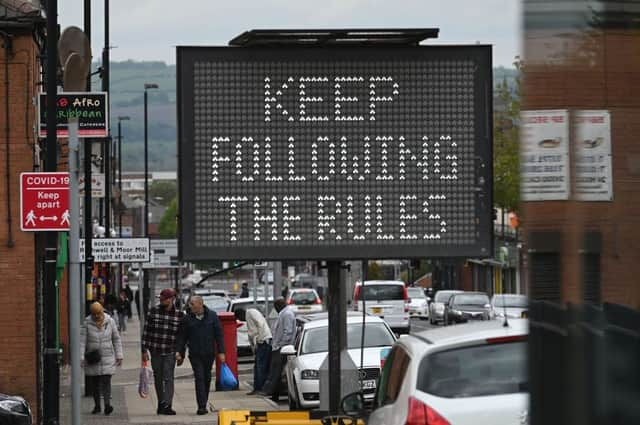June 21 lockdown lifting ‘to be delayed by two weeks’ to allow time for more jabs
This article contains affiliate links. We may earn a small commission on items purchased through this article, but that does not affect our editorial judgement.


The planned ending of all lockdown restrictions in England on 21 June could be delayed by two weeks, according to reports.
Cabinet ministers are said to be increasingly pessimistic about the possibility of lifting all Covid rules following a “downbeat” briefing from Professor Chris Whitty and Sir Patrick Vallance.
Latest Covid data is ‘fairly grim’
Advertisement
Hide AdAdvertisement
Hide AdProf Whitty, the chief medical officer for England, and Sir Patrick, the chief scientific adviser, have a briefing to ministers on Monday (7 June) on the latest Covid-19 data, which was described as “fairly grim”.
The pair expressed concerns about the current rate of transmission of new coronavirus strains, including the highly transmissible Delta variant which originated in India, and warned that vaccinations do not provide 100 per cent protection.
On Monday (7 June), the UK recorded more than 5,600 Covid-19 cases, which is a significant increase from around 1,350 infections at the beginning of May.
With millions of Brits still unvaccinated, there are concerns that lifting restrictions as planned on 21 June could result in a surge in cases.
Advertisement
Hide AdAdvertisement
Hide AdOne cabinet source told The Times they expect a delay of anywhere between two weeks and two months.
Ministers are said to be of the view that the political impact of any delay to lifting restrictions to allow more people to be vaccinated would be limited if lockdown ends in time for the start of the summer holidays in late July.
Environment Secretary George Eustice has said the government will not “rule anything out” amid reports there may be a two-week delay to ending restrictions, and said the “critical test” will be whether those who are vaccinated are being infected.
He told Sky News: “The Prime Minister has always said he’s going to take this a step at a time and that with each set of relaxations they’re going to basically assess the data when we get there.
Advertisement
Hide AdAdvertisement
Hide Ad“So we can’t make the final assessment until 14 June, that’s what he’s said all along. And we obviously don’t rule anything out.”
“It’s too early to say yet what we’ll do — we’ll be announcing that next Monday.
“What we’re not seeing at the moment is that growth in hospitalisations associated with (infections) and that’s because we know that if people have the vaccine, particularly once they’ve had the second jab of the vaccine, it actually does give them immunity to this new strain that’s around.”
Despite concerns the lockdown roadmap may be delayed, Boris Johnson said last week that he could “see nothing in the data at the moment that means we can’t go ahead with step four” as planned on 21 June, although he warned that the data was “still ambiguous”.
Allowing more time for vaccinations
Advertisement
Hide AdAdvertisement
Hide AdIf the lifting of lockdown were to be delayed, it would enable all adults aged 50 and over to be fully vaccinated and would provide enough time for the jabs to take effect before restrictions are lifted.
So far, around 40.4 million people have received their first dose of a Covid-19 vaccine in the UK, which equates to about 76.8 per cent of the adult population.
Around 27.9 million are now fully vaccinated, which amounts to about 53 per cent of all adults.
As of 6 June, England has delivered 23,710,646 second doses of a Covid-19 vaccine, meaning the equivalent of 53.6 per cent of the adult population is now fully vaccinated, with 76.4 per cent of adults having received one dose.
Advertisement
Hide AdAdvertisement
Hide AdIn Wales, 49.5 per cent of its adult population is fully vaccinated, while 86.5 per cent have received their first jab.
A similar picture can be seen in Scotland with 50.6 per cent of adults now fully vaccinated, with 76.4 per cent having received a single dose, while 48.9 per cent of Northern Ireland’s adult population is fully vaccinated, with 71.5 per cent given one dose.
The aim to vaccinate all adults is well underway in Northern Ireland and Wales, with all adults having already been called up to receive their jab, while in Scotland, people aged 18 to 29 have been invited to register for their jab, with appointments starting in mid-June.
In England, people aged 25 to 29 are now being called to book their jab and it is hoped that all adults aged 18 and over will have been offered their first dose by the end of July.